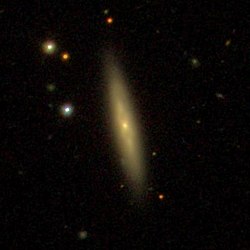NGC 4892 is a spiral[2][3][4] or lenticular galaxy[2] with LINER activity[4] located 275 million light-years away[5] in the constellation Coma Berenices.[6] It was discovered by the astronomer William Herschel on April 11, 1785,[6] and is a member of the Coma Cluster.[7]
| NGC 4892 | |
|---|---|
 SDSS image of NGC 4892. | |
| Observation data (J2000 epoch) | |
| Constellation | Coma Berenices |
| Right ascension | 13h 00m 03.5s[1] |
| Declination | 26° 53′ 53″[1] |
| Redshift | 0.019690[1] |
| Heliocentric radial velocity | 5903 km/s[1] |
| Distance | 275 Mly (84.2 Mpc)[1] |
| Group or cluster | Coma Cluster |
| Apparent magnitude (V) | 14.2[1] |
| Characteristics | |
| Type | Sb[1],S0-a[2] |
| Size | ~180,000 ly (56 kpc) (estimated)[1] |
| Apparent size (V) | 1.57 x 0.38[1] |
| Other designations | |
| CGCG 160-81, MCG 5-31-78, PGC 44697, UGC 8108[1] | |
See also
editReferences
edit- ^ a b c d e f g h i j "NASA/IPAC Extragalactic Database". Results for NGC 4892. Retrieved November 10, 2018.
- ^ a b c "HyperLeda -object description". leda.univ-lyon1.fr. Retrieved November 10, 2018.
- ^ "Your NED Search Results". ned.ipac.caltech.edu. Retrieved November 10, 2018.
- ^ a b "NGC 4892". Retrieved November 10, 2018.
- ^ "Your NED Search Results". ned.ipac.caltech.edu. Retrieved October 31, 2018.
- ^ a b "New General Catalog Objects: NGC 4850 - 4899". cseligman.com. Retrieved November 11, 2018.
- ^ "Detailed Object Classifications". ned.ipac.caltech.edu. Retrieved November 11, 2018.
- "NGC 4892". Retrieved November 11, 2018.
External links
edit- Media related to NGC 4892 at Wikimedia Commons
- NGC 4892 on WikiSky: DSS2, SDSS, GALEX, IRAS, Hydrogen α, X-Ray, Astrophoto, Sky Map, Articles and images